- Home
- Upton Sinclair
Between Two Worlds (The Lanny Budd Novels) Page 5
Between Two Worlds (The Lanny Budd Novels) Read online
Page 5
“I found it so,” said Lanny.
“Is that Marcel’s?”
“Marcel wasn’t painting then. It’s an Oscar Deroule. He was a fashionable painter of the fin de siècle Robbie says it is the sort of thing they put in high-class American bars.”
“You can put it in a bar or in a church, according to how you look at life,” said Kurt.
After he had studied this work, Lanny said: “I’ll show you Beauty dressed for church.” He took the cloth into the storeroom and put it over another painting and brought it forth; he set it on the easel, and with a proper sense of drama lifted the cover. This was the Sister of Mercy, which Marcel had made of his wife during the long agony of the battle of Verdun. Beauty wore a nurse’s costume, and in her face was all the anguish and pity that Marcel had seen while she was bringing him back to life. Kurt, who had had the same experience, rejoiced that a painter had immortalized the soul of this woman they both had loved.
One by one Lanny brought out the best of his stepfather’s works: his war painting of the poilu, and the dreadful one he had called Fear. Nobody was to see that, Marcel had said, until the Germans could see it also. Now a German saw it, and knew that what he had suffered in his secret soul was the same as a Frenchman had suffered. Why should either have wished to inflict it upon the other? So Marcel seemed to say, and Kurt felt himself at one with his late antagonist.
Lanny brought out samples of the earlier work: the scenes of the Cap, which Kurt could check in various weathers and at various hours of the day; those of Norway, and the Isles of Greece and the shores of Africa, fruit of the Bluebird cruises. After Kurt had seen a dozen or so of these, he felt he knew Marcel both as painter and as man, and was not ashamed to be his successor in love.
XI
Once every twenty-four hours a glow stole up behind the Cap and spread over the sky, and dazzling sunlight descended upon the flowers and foliage and red-roofed houses of Bienvenu. The great orb moved its appointed way over the blue Mediterranean, and sank in a blaze of color behind the dim Estérels. Then the dark half of the sky-wheel moved through its unvarying course, and streams of twinkling stars dropped into the abyss behind the mountains. Every four weeks the moon appeared as a gleaming crescent above the same mountains, and night by night grew larger until it was a great silver ball, by whose light the woods and gardens took on a new and mystical beauty, troubling to the soul. The flowers poured out their tiny jets of perfume upon the still night air, and two young musicians would sit upon the shore, watching the lights of the city across the bay and listening to the sounds of distant music, experiencing a strange awe which they sought vainly to express in their art.
Here was everything that a lover of nature could ask, and more than any philosopher could understand in the longest lifetime. The flowers in the crannied walls held all the secrets of God and man; like sun and moon and stars, they too had their appointed courses, they budded, blossomed, died, and were renewed according to age-old patterns. There was an insect world living upon the plants and upon itself, and a bird world living upon both. If you looked below the surface of the sea, you found a myriad of fantastic forms, each following unceasingly its predatory role. Who or what had been interested to contrive these complicated structures and inspire them with a determination to struggle and seek through millions of centuries? And those more powerful creatures which had a brain, and were able to study and comprehend the others, and use them for their purposes—yet knew no more why they did it, or thought they ought to! “So hot, little sir?” the stars had said to Emerson; and Lanny gave this great man’s essays to Kurt, introducing him to New England transcendentalism, stepdaughter of Kurt’s German idealism.
The two budding philosophers would take long walks at night, when no one paid any attention to them. They would wander over the shore-paths which had delighted them in boyhood; they would visit by moonlight the ruins of long-dead civilizations, and speculate as to what had brought them down and whether the same forces were at work in their own heedless world—but not quite so sure of itself as it had been a few years before! Kurt would be moved to tell what he had experienced during the war, and Lanny during peace-making. Across the bay lay the Ile Sainte-Marguerite, where Kurt’s aunt, the Frau Doktor Hofrat von und zu Nebenaltenberg, had been interned as an enemy alien for five years. Now she was home again, hating the French. Kurt told about her and other members of his family, all greatly reduced in circumstances but not in pride.
As time passed, Beauty’s fears diminished, and she was willing for them to take walks by day, provided they kept out of the towns and never spoke German. Tourists were numerous, and the sight of a tall man with blond hair and blue eyes no longer attracted attention. The two friends dived off the rocks, they sailed in the golfe and outside it, they climbed into the distant hills covered with thyme and lavender, and looked upon orange and olive vineyards and the marble palaces of fashionable folk. Once again they sat in front of that ancient monastery of Notre-Dame-de-Bon-Port and gazed at the lovely prospect of blue and green water, the shining towns of the Riviera, and the Italian Alps with their snowy tops. From here the Esterels were dark red porphyry, and the horizon was a blur of blue mountains where it was not a ring of blue sea.
Here six years earlier two boys had sat, talking with preternatural solemnity about their lives and what they were going to make of them. Lanny had been the more deeply impressed, and recalled what his older friend had said about the mission of art and their duty as carriers of the torch of culture. Kurt remembered it, and declared that he still held to that faith. It was profoundly true that movements of the human spirit came first, and that the events of history were consequences thereof. Very tactfully Lanny sought to encourage this mood in his friend; for history had been hard upon Kurt and his people, and it was much desired by the rest of the world that they should draw back into themselves and experience a new birth of the spirit.
In the earlier, boyhood conversation Lanny had enlisted himself as a disciple of German idealism, and now he told his friend that he was waiting to be justified in his faith. All three of the great B’s of German music, Bach, Beethoven, and Brahms, were calling to Kurt Meissner to carry on their tradition. Lanny talked about them with such intensity of feeling that the German was deeply touched. The new Kurt of political bitterness seemed to fade and dissolve, and the old Kurt of moral fervor and devotion came back to life. When in the twilight they descended the slope, it seemed to Lanny that the war was really over and the soul life of Europe beginning again.
3
Double, Double Toil and Trouble
I
Eric Vivian Pomeroy-Nielson had planned to devote his life to the study of what he called “theater.” He had chosen that career after seeing his first children’s play at the age of six, and from then on he had set out to learn all he could about playwriting and acting, stage- and scene-painting, music, poetry, and dancing. The practice of these combined arts would, of course, call for a lot of activity; one would have to go about, and stand up and show other people what to do, and stick at it through all-night rehearsals; and here was Rick, at the age of twenty-two, a war cripple with essential parts of one knee missing and a steel brace on his leg. Also with a wife and baby, and his father having to sell parts of the family estate on account of war taxes. But still, Rick wasn’t going to give up his career!
“It’s dogged as does it,” is the English saying, and Rick had figured out a long campaign, beginning with those activities which were easiest. He didn’t need his knee to work a typewriter, so he would acquire that art, and at the same time practice writing. He would make some money, and, if possible, a reputatoion; then he would do a play, and his father would help him to find a producer, and he could go in his own right and sit in a chair and watch rehearsals, and if his play was a success, a whole chain of mountains would come to Mahomet.
All this Rick wrote to his friend Lanny Budd, with many typographical errors; it was his first job on a machine, he said, an
d Lanny put the letter away in his desk, certain that it would find a place in a museum some day. Just as Lanny knew that Marcel Detaze was going to be recognized as a painter, and Kurt as a composer, so he knew that Eric Vivian Pomeroy-Nielson would become a famous name of the English theater. Almost at once Lanny’s judgment began to be vindicated, for as soon as Rick had learned to do a manuscript without errors he wrote a sketch drawn from his war adventures, the simple story of a flier who started out at dawn and what thoughts went through his mind as he headed for Germany. It was authentic and moving, and was accepted and paid for by the first newspaper to which Rick offered it. Lanny was so pleased, he bought every copy of the paper he could find in Cannes, and sent one to his father in Connecticut and others to friends who had met Rick.
The baronet’s son, brilliant and versatile, was also trying his hand at poetry. His own severest critic, he wouldn’t send any of it to Lanny. Nobody could possibly publish it, he declared, because it was so bitter. He was one of those many heroes who were not satisfied with what they had accomplished by their sacrifices and were questioning the whole universe to know who was to blame. Was it the stupid old men who had sat in the council chambers and sent the young men out to be drowned in mud and blood? Was it all mankind, which was able to invent and build machines but not to control them? Was it God, who had made men wrong—and why? Rick quoted four lines from a poem he called After War:
Are nations like the men they make?
Or was it God who fashioned men?
O God, who willed the clay awake,
Will now to sleeping clay again!
Lanny was impressed by these lines and begged for the rest, and Rick with a sudden impulse sent him a large batch of verses, saying that they were hopelessly crude but couldn’t do any worse than bore him. However, Lanny refused to be bored; he thought that Rick was voicing what was in the hearts of millions of people, himself included. It happened that in London, at the home of Lady Eversham-Watson, Lanny had met a magazine editor, and, without telling Rick, he sent the poem After War and was delighted when the editor offered to publish it and pay two guineas.
Kurt agreed that the verses were good; and Jerry Pendleton, sarcastic fellow, remarked—not in the presence of Kurt—that any German would be glad to hear that an Englishman regretted having licked him. Jerry was one doughboy who had no sorrows over the Versailles treaty, and declared that “Old Whiskers,” as he irreverently called Kaiser Wilhelm, was a lot better off sawing cordwood at Doom. Lanny’s former tutor had heard a lot about Kurt Meissner, so it had been necessary to take him into the secret; but of course he didn’t know about Kurt’s having been a secret agent. If he guessed the situation between Kurt and Beauty, he was discreet enough never to refer to it.
II
The fact that Rick had come so near to Kurt’s point of view concerning the late unpleasantness made easier Lanny’s project for reconciling England and Germany. Kurt said that Rick had evidently matured into a man of judgment, and that it would be a pleasure to meet him again. So Lanny’s letters to Rick and Nina began to be full of the wonders of the Côte D’Azur: the lovely flowers in their garden, the soft white sand of the beach at Juan, the delights of sailing in the bay, the health-giving qualities of ozone and sunshine. When Rick developed a cold, the pressure became intensified. More people had died of the flu than had been killed in the war—and England had lost too much of its young manhood already!
Lanny repeated the arguments which had succeeded with Kurt. What was the use of a fellow’s having money if he couldn’t spend it on his friends? Robbie Budd knew Rick and admired him, and had cabled offers of help when he had learned about Rick’s crash. Now that kind father was sitting at home, unhappy because Lanny wouldn’t spend his money; it could only mean that Lanny had been seduced by the propaganda of the Reds and was offended by the smell of munitions profits! But if Lanny should cable that he wanted to rent a villa for Rick and his family, Robbie would cheer up at once. Lanny wrote this, and then, fearing that it might not be the best argument for an anti-war poet, he tore up the letter and wrote another of somewhat doubtful ethical quality—he offered to spend for Rick that thousand dollars which he had got from the State Department of the United States, and which he had already spent for Kurt’s piano! A genial device: Lanny would keep that thousand dollars in mind, and spend it over and over on anybody who had conscientious scruples against munitions profits!
Sophie, Baroness de la Tourette, had a pleasant, little villa on the other side of the Cap, near Antibes, where she had stayed off and on for years. Now she had gone to visit her people in Cincinnati, and wrote Beauty that she was remaining in order to get a divorce. “The hardware business has been shot to pieces,” she explained, “and I find I can’t afford the upkeep of a title.” Lanny sent her a cable, offering to rent the house for Rick, and she said all right, and after he had done it Rick had to come.
Lanny met the little family at the station. He saw that Rick was thinner; he was working hard, and forcing himself to take exercise. His keen features had more of the old fire in them, and Lanny realized that it was one thing to weep for the world’s wrong, and another to write verses about it. Rick had always been mature beyond his years. He made jokes in his old fashion, and spoke with his customary contempt of those whose artistic standards were beneath his own. There were touches of gray in his wavy black hair; this appeared to be one of the effects of shellfire upon the human organism.
Nina was her pretty, birdlike self, only she was a mother-bird, and both husband and son were her babies. Little Alfy, as they called him, had been named after his grandfather, but was a miniature of Rick; he didn’t take kindly to railroad trains and automobiles, but was trying to get loose and start to explore the wonderful new world. He had been born in the midst of war and horror, but didn’t know anything about it. Was this a blessing of nature or a betrayal? His father asked the question in a sonnet.
They drove first to Bienvenu to have lunch, and on the way Lanny told about Kurt’s state of mind, and asked his friends to go easy on the subject of the past five years. He told about the concerto, now finished. Incidentally he remarked, quite casually: “Kurt has become Beauty’s lover.” Such was the correct tone among the young sophisticates. You said it en passant, as if it were: “Beauty and Kurt have gone sailing this morning.” Your friends said: “Oh, jolly!” or “Ripping!” and that was that.
III
Rick hadn’t seen Beauty or Kurt since the outbreak of the war, and Nina had never met either of them. So there were greetings to be exchanged and curiosities to be satisfied. Little Alfy was set down in front of Baby Marceline, who gazed at him with wide brown eyes and one finger in her mouth; he took command, as he would throughout life: seeing the dogs, he toddled after them, and Marceline followed. He was going to be a baronet and a member of the English ruling classes, and Marceline was going to have a half-share of Bienvenu, a valuable property; also of whatever her father’s paintings might bring. As soon as they were born Lanny had written the two mothers, bidding them start matchmaking, and in their minds they had done so; now when their eyes met there was appraisal, not merely of each other, but of the future of two families.
Lanny and Rick and Kurt at Hellerau had dubbed them selves the three musketeers of the arts. “When shall we three meet again In thunder, lightning, or in rain?” So they had asked, and here was the answer. There had been plenty of thunder and lightning, but now the uproar had died away, there was a rainbow in the sky, and a heavenly melody floating in the air, as you hear in the William Tell overture—or preferably in Beethoven’s Pastoral Symphony, since Kurt Meissner will tell you that Rossini’s music is somewhat meretricious. It will be to music of the highest quality that these three musketeers march forward into life, resolutely, in spite of defeats and disappointments. When Rick hears fate knocking at the door in four thundering notes it will not tell him that he is growing deaf, but that he is a cripple for life; and with the help of art he will learn to take thes
e blows of fate and make a scherzo out of them, and in the end perhaps a triumphal march.
After lunch Lanny drove the new family over to their temporary home, which he had stocked up with tinned goods enough for an African safari. There was one of Leese’s able-bodied relatives to act as maid-of-all-work; one of her orders would be to carry Rick’s typing machine out to a rustic table every morning when the weather was fair. There he would sit alone, and his rage against human stupidity would fan itself white hot, and molten words would pour from the typewriter, all but burning the pages. Strange as it might seem, the more he lashed the damned human race the better they liked it; such was the mood of the time—all thinking men agreed that the peoples of Europe had made fools of themselves, and it was proof of advanced views to abuse the “old men,” the “brass hats,” the “patrioteers,” the “merchants of death.”
It was as if you had been on a terrible “bat” the night before, and had got into a row with your best friend and blacked both his eyes. Next morning you were apologetic, and willing to let him have the best of all the arguments. So it was that both Lanny and Rick dealt with their German friend; the Englishman talked as if it was really quite embarrassing to have won a war, and of course what he wrote about British bungling pleased Kurt entirely—only he found it difficult to understand how British editors were willing to pay money for it!

 Prince Hagen
Prince Hagen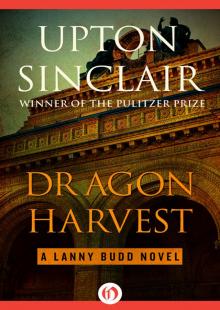 Dragon Harvest
Dragon Harvest The Jungle
The Jungle Sylvia's Marriage
Sylvia's Marriage Oil! A Novel by Upton Sinclair
Oil! A Novel by Upton Sinclair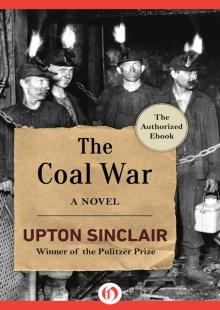 The Coal War: A Novel
The Coal War: A Novel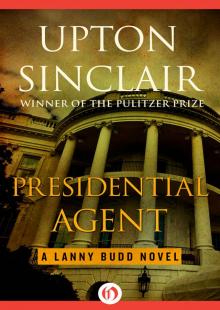 Presidential Agent
Presidential Agent World's End
World's End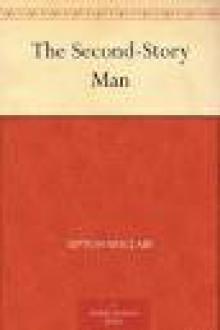 The Second-Story Man
The Second-Story Man O Shepherd, Speak!
O Shepherd, Speak!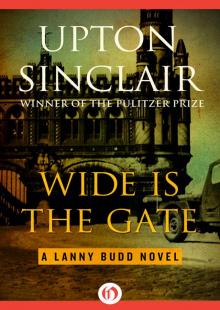 Wide Is the Gate
Wide Is the Gate The Return of Lanny Budd
The Return of Lanny Budd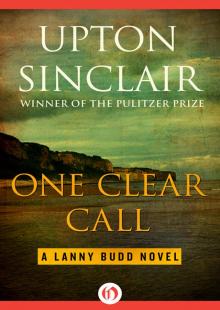 One Clear Call I
One Clear Call I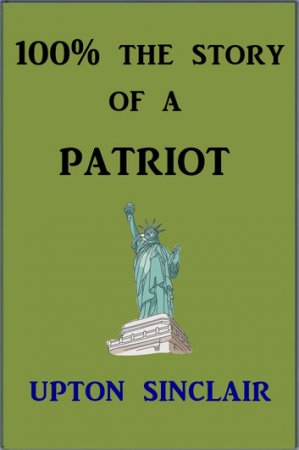 100%: the Story of a Patriot
100%: the Story of a Patriot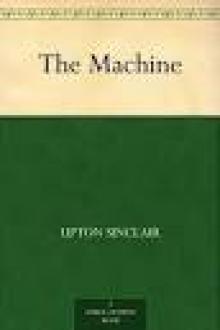 The Machine
The Machine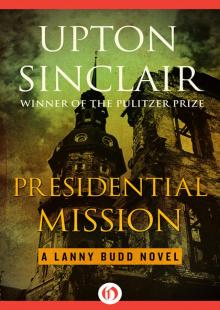 Presidential Mission
Presidential Mission A Cadet's Honor: Mark Mallory's Heroism
A Cadet's Honor: Mark Mallory's Heroism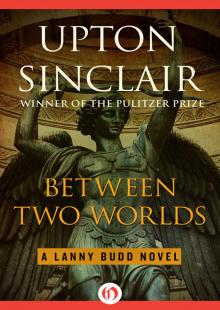 Between Two Worlds
Between Two Worlds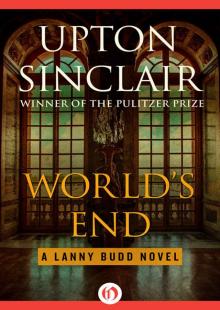 World's End (The Lanny Budd Novels)
World's End (The Lanny Budd Novels)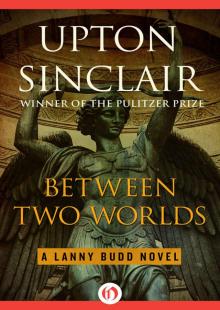 Between Two Worlds (The Lanny Budd Novels)
Between Two Worlds (The Lanny Budd Novels)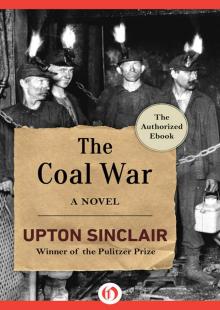 The Coal War
The Coal War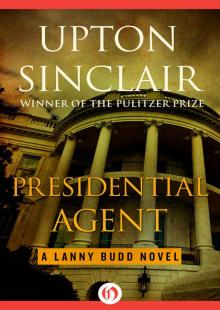 Presidential Agent (The Lanny Budd Novels)
Presidential Agent (The Lanny Budd Novels) Oil (filmed as There Will Be Blood)
Oil (filmed as There Will Be Blood)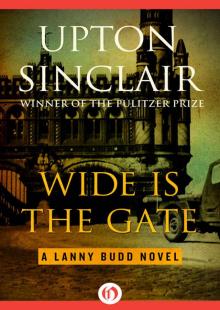 Wide Is the Gate (The Lanny Budd Novels)
Wide Is the Gate (The Lanny Budd Novels)